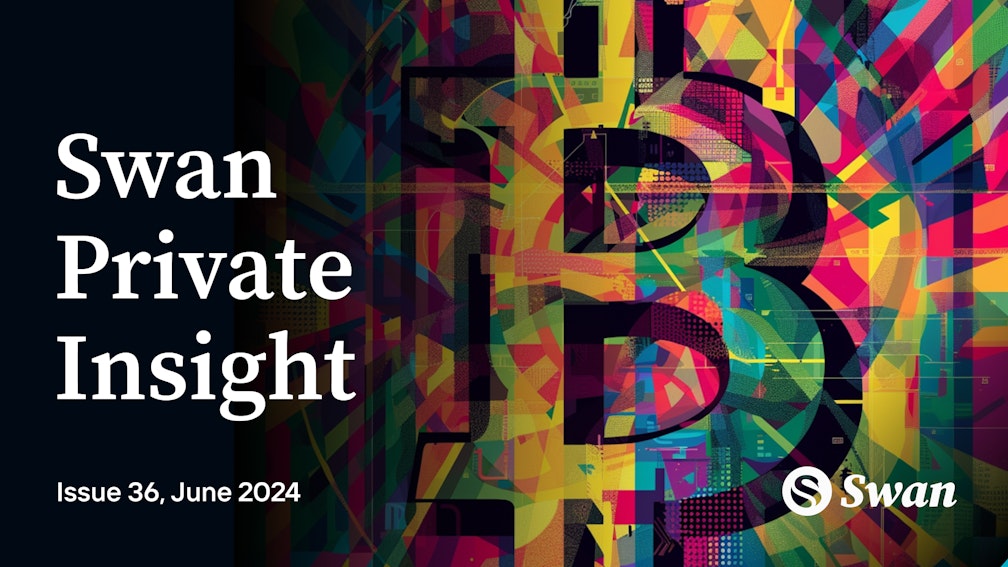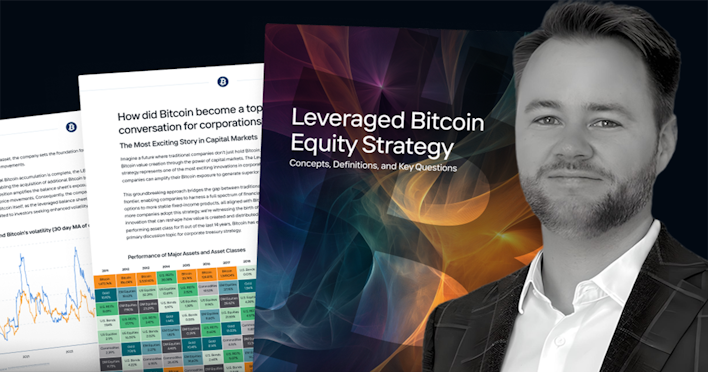
Swan Private Insight — Issue 36, June 2024
Swan Private Insight is our free monthly research report exclusively for ALL Swan Private client (anyone who spends over $100k with Swan).


Recently, while traveling abroad in Norway, I found myself on a tour bus listening to the explanations and rationalizations of a local tour guide on why his pension and health care, along with those of all other Norwegians, were being reduced and delayed. This was simultaneously saddening and frustrating, since such indignities are what Bitcoiners are warning about and fighting against globally — yet so few people have heard the message.

Swan Private Insight is our free monthly research report exclusively for ALL Swan Private client (anyone who spends over $100k with Swan).
Inside this issue you’ll find:
… and more!
Norway is known for administering the world’s largest sovereign wealth fund, with roughly $300,000USD per person in its “Government Pension Fund Global.” Also known as the “Oil Fund, ” this fortune has come about largely from the nation’s development of petroleum extraction.
Sadly, in the same vein as the famous Bitcoin motto which states “Not your keys, not your coins, ” the Norwegians now may as well say, “Not your cash, not your pension, ” since they aren’t getting that money on the terms they had been led to believe they would during their decades of hearing how rich they were.
An exact quote I wrote down from our guide was: We cannot use the money we have. Not everyone understands that.
“Bitcoiners understand that” I found myself responding under my breath.
Most national pension plans around the world are unfunded, making them eerily similar to Ponzi schemes. But even in Norway, where the plan is fully funded, the distributions are determined by the plan administrators, and those rulers can and do change the rules.
I resisted my urge to scream out “Bitcoin fixes this!” After all, we were not on some “Macroeconomics of Norway” tour. Our guide simply had time to spare on the return trip from our mountaintop excursion, and discussing the state of the Norwegian economy was the topic he chose to bring up. I sensed that perhaps a decade earlier, he would have been less modest in his description of Norway’s social programs but that he had been humbled as his own retirement approached and the reality of the situation set in.
As our guide elaborated about the weakness of their currency, the Norwegian Kroner, my wife began dozing off. She first noted to me that this sounded like one of the many Bitcoin discussions she overhears from me when we are not vacationing. (The Norwegian Kroner has lost half its value against the U.S. dollar since the 2008 financial crisis, falling from 20 cents to 10 cents per Kroner.)

I felt extremely grateful once again for Bitcoin as I heard all this. Here, after all, was someone making the perfect case for self-custody of one’s wealth. He had been expecting certain pension benefits his whole life, but now could not access the money he had thought would be his. Retirement had been pushed to age 67 from age 65, and benefits had been reduced, especially when adjusted for inflation and the loss of purchasing power of his national currency. Yet there was nothing he could do about that. He explained that most Norwegian pensioners still chose to work to supplement their pensions, indicating that actual retirement on the pension was not practical for many.
As I, too, get closer to an age where I might want or need to retire, I increasingly realize the real value behind the bargain that Bitcoin offers me. That deal is that Bitcoin won’t change the terms it makes with all its participants. Those terms are, among others:
(1) Our Bitcoin is ours to spend – Whenever and however we choose to spend it. No administrators or rulers will tell us that we must wait to withdraw it, or that we may only withdraw less of it than they originally said we could;
(2) Our Bitcoin cannot be diluted - That 21 million coin supply cap is not some temporary policy that will be revoked during a time of challenge or crisis. It is an unbreakable, unalterable fact that we can count on and plan on for our entire lives — and if we want to, for the lives of our heirs and beneficiaries.
(3) Our Bitcoin is fully portable — It is not a local currency that is only honored in one region on Earth, and tied to our good standing with one particular government. This third point is, admittedly, currently of somewhat limited applicability because Bitcoin is still a fringe currency and neither widely accepted nor terribly easy to convert all over the world. But this will change in time. With Bitcoin ETFs popping up all over the world at an incredibly fast pace (the USA, Canada, Australia, Hong Kong, and the UK already) it’s not at all far-fetched to think that convertibility to local currency in many places is not far off, and that direct spending is only a cycle or two away.
In short, Bitcoin can be relied on to honor its side of the bargain with those of us who sign up for it. Bitcoin is an honorable counterparty in long-term arrangements. This is the biggest difference between Bitcoin and its alternatives.
There are many criticisms of the financial system we live under now. To me, the most insidious offense is how it betrays the aging population, proceeding in a gradual, subtle way but with extremely harmful effects. It is only after decades of savings, and by the time one’s vitality, energy, health, and adaptability are diminished, that most people realize the money they’ve toiled to set aside for their future is insufficient to allow them to take care of themselves. It is a betrayal that is not only shocking and terrifying in terms of their self-sustenance, but also an insult to and a shattering of their pride.
It says “Despite your efforts, you failed to take care of yourself, and now must live out the rest of your life with less wealth than you expected.”

And what was the cause of such a failure to be able to fund our later years?
It was naive to trust in the financial system. Among other things, this tragedy mostly comes down to failing to appreciate the consequences of compounding modest inflation over many decades, along with occasional short-lived, not-so-modest periods of inflation. But it also comes down to naive beliefs that promises made by politicians and employers would be kept for decades — promises that those politicians and executives are not around to keep when they come due and whose successors eventually break, saying then that they are impossible to keep. In short, politicians and executives do not honor the long-term promises they make. They are dishonorable.
I fully expect Bitcoin to fix this problem, for those who save in Bitcoin at least. Bitcoin does not experience a slow, compounding rate of inflation with occasional bursts of high inflation. It has a perfectly predictable rate of issuance. You can, at any age, calculate with certainty what the supply of Bitcoin will be at your age of retirement. With fiat money, you cannot even do this reliably when retirement is merely a few years away.
With Bitcoin, nobody makes you promise that they won’t be around to keep when it comes time to cash in on your savings. You are the promise-maker and the promise-keeper in Bitcoin. You keep the promise by keeping the rules in place through the simple act of running a Bitcoin node—software that you can run on your laptop.
This value is extremely hard to appreciate when one is young. However, when one has lived, worked, and saved for a few decades, it is a profoundly reassuring and satisfying value. It becomes easier to appreciate when you contrast how you are protected by this value while others around you, sadly, are not.
Indeed, this was my experience listening to the lamentations of my Norwegian tour guide. My decision to save in Bitcoin frees me from the tragic plight of inflation-burdened, pension-administrator-dependent masses who have not discovered Bitcoin.
It reinforces and clarifies to me that Bitcoin is not a get-rich-quick scheme. Rather, it is a long-term savings technology. Moreover, it is not just a long-term savings technology. It is the best long-term savings technology that exists.

Bitcoin only happens to potentially be a get-rich-quick technology at this time because we are so early in its deployment that the overwhelming majority of the world’s long-term savers have not yet come to understand or adopt it as such. As they do come around, the nature of this long-term savings technology will, admittedly, cause its short-term value to surge. However, this is merely a side-effect of the adoption process of Bitcoin as a long-term savings technology.
Ours will be the only generations that experience rapid appreciation of purchasing power. As it matures, Bitcoin will be recognized for what it primarily is — stable, long-term money. You can save a week’s effort when you’re young and cash it in for a week’s worth when you’re old.
But why is this realization about Bitcoin’s core value so elusive to so many today?
For one, many young people are not aware that they even need this benefit, or that it is unavailable through any other technology. This used to be the case, at least. Today’s young people, however, have become much more cynical and skeptical regarding even shorter-term savings than those for their retirement. They recognize that home ownership during their early working life is out of reach. They know there is a big problem. Yet it is not clear that Bitcoin is the fix because there is not sufficient education or history to make it clear. There is no older generation of comfortable Bitcoiners or formal schooling curriculum to make this example obvious. Many are thus driven towards looking for quick solutions.
As for the older generations, it largely comes down to the old adage that it is hard to teach an old dog new tricks. Set in their ways of a lifetime without such technology, the breakthrough that Bitcoin represents seems implausible, impossible, or unavailable to them.
This will, of course, change, but only with the passage of time. How, after all, can we expect people to recognize the durability of a thing so new that it has not had the time to demonstrate its endurance?
So, for now, it is primarily those who study the fundamentals of the system who are completely confident in its longevity and who understand this most important feature of Bitcoin.
Meanwhile, there are plenty of people who misunderstand Bitcoin but consider it a short-term opportunity. These are the speculators who cash out during surges in the fiat price. However, they will find themselves chasing their own tails during this generational shift from unreliable and ineffective savings technology to reliable and effective Bitcoin.
This phenomenon has already been widely observed during previous cycles. In fact, selling Bitcoin after buying it at a lower price, only to observe it rise even higher, teaches many people that Bitcoin is a long-term savings technology and not a flash in the pan.
And, when finally viewed as long-term savings technology, it becomes straightforward to see why the complaints, criticisms, and actions of Bitcoin’s cryptocurrency competitors are misplaced.
Those who complain that Bitcoin is too slow, with its ten-minute-long confirmation times, fail to appreciate that ten minutes is still over 52,000 confirmations a year (that’s 520,000 over ten years and 2 million over a forty-year career dedicated to earning and saving) — more than enough over the long term. These critics are caught up in short term applications of money like buying coffee. Perhaps they’ve already had too much coffee and hopped on caffeine. Bitcoin (on-chain, at least) admittedly is not ideal for instant movements of small amounts of value (although the Lightning Network does solve this).
But instant movements of small amounts of value are not a problem the world faces. Long-term, reliable savings for retirement, however, is a huge problem.
Similarly, critics complaining that Bitcoin is limited in its applications — that it cannot efficiently issue tokens, securities, stablecoins, or digital artifacts — are also missing this main point. None of those applications are problems that are not already solved by straightforward, traditional databases. The frenzy of speculation on blockchain-issued digital assets, however, does already have enough of a history to make intelligent observers highly dubious. Unlike Bitcoin, these applications are, in fact, get-rich-quick schemes for some while leading to get-poor-quick outcomes for many more. Issuing these assets and dumping them on others before attention moves on to the next hot trend is the game being played here. These are, at best, high-speed gambling services, and worse, oftentimes also frauds.
Such “applications” are hardly a solution that we need more of, and they are certainly not alternatives to Bitcoin’s core benefit of providing reliable, long-term savings.
For the first time in our lifetimes, we have the opportunity to save reliably over the long-term. In this time of rapid changes, something that changes very little, if at all, and can be relied upon to still be here, in the same state, decades down the road is a precious and unique treasure. So few things possess this characteristic that we may be inclined to believe that nothing does. But Bitcoin is the exception — making it exceptional. Bitcoin is a technology for all ages, for ages. Use it wisely.

Swan is a leading Bitcoin financial services company with more than 120,000 clients and 170 employees, operating globally. Established in 2019, Swan helps individuals and institutions to understand and invest in Bitcoin. The Swan app simplifies Bitcoin purchases with instant and recurring buys. Swan IRA provides a tax-advantaged solution for saving Bitcoin in retirement accounts.
For HNWIs and businesses, Swan Private provides white-glove service for large purchases, treasury solutions, and employee Bitcoin benefits. With Swan Vault, clients can easily custody their own Bitcoin with peace of mind. Financial advisors trust Swan Advisor for client Bitcoin allocations, backed by world-class custody and educational content.
Swan Managed Mining provides clients with fully segregated and dedicated mining operations, catering to their unique requirements, opportunities, and strategic advantages. Swan prides itself on exceptional client service, making Bitcoin accessible to all. For more information, please visit swan.com.
Tomer Strolight is Editor-in-Chief at Swan Bitcoin. He completed bachelors and masters degrees at Toronto’s Schulich School of Business. Tomer spent 25 years operating businesses in digital media and private equity before turning his attention full time to Bitcoin. Tomer wrote the book “Why Bitcoin?” a collection of 27 short articles each explaining a different facet of this revolutionary new monetary system. Tomer also wrote and narrated the short film “Bitcoin Is Generational Wealth”. He has appeared on many Bitcoin podcasts including What Bitcoin Did, The Stephan Livera Podcast, Bitcoin Rapid Fire, Twice Bitten, the Bitcoin Matrix and many more.
News
More NewsThoughts on Bitcoin from the Swan team and friends.



By Alex Stanczyk
After managing a Swiss gold fund for 8 years, I realized Bitcoin surpasses gold as the ultimate store of value. Here’s why every gold investor should study Bitcoin closely.



By Swan Bitcoin
Ben Werkman joins Swan as CIO. New LBE primer explains key concepts, implementation steps, risk management, and valuation approaches.



By Cory Klippsten
Today we announce a new suite of security enhancements and elevated service tiers, reflecting our commitment to serving the Bitcoin-based investor.